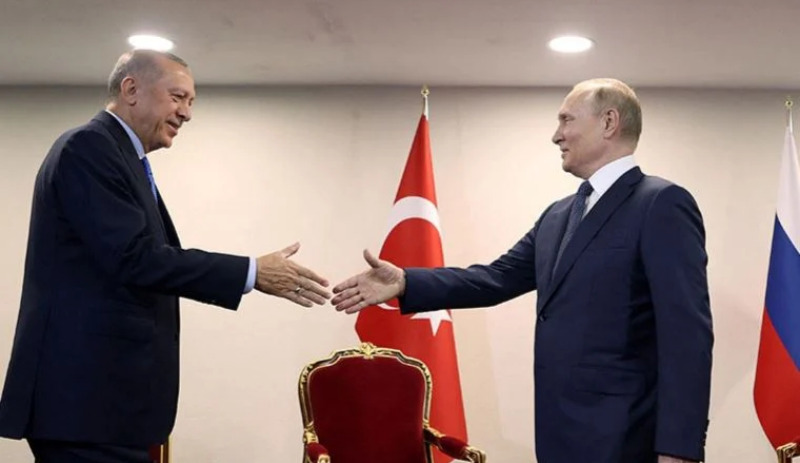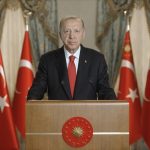Recent revelations of deepening Russo-Turkish economic ties despite the Ukraine war forces the U.S. to reckon with Russia’s wider strategy.
The Kremlin’s strategic objective in the Eastern Mediterranean and the Black Sea since the late 2000s has been to reorient Turkey, peeling it from the Atlantic Alliance and shifting it to the Russian camp. https://5390336f8e244a1a6f018bae30169861.safeframe.googlesyndication.com/safeframe/1-0-38/html/container.html
The U.S. can no longer afford to ignore the realities of geopolitics: Turkey must be returned to the Western fold. The U.S. must apply the inducements, positive and negative, necessary to ensure Turkish compliance. Most critically, it should modify the geopolitical situation to remove the incentives Russia has created for reorientation, and to support Ukraine in its liberation of the Crimean Peninsula.
The Ukraine war’s strategic prize is clear for the Kremlin. Russia sought to subjugate Ukraine and draw it into an autarkic bloc that presses NATO’s eastern flank overland. It still seeks this goal but, more immediately, it hopes to solidify a land corridor to Crimea, allowing it to project power in the Black Sea, while driving Ukraine from the Donbas region.
Geopolitically, however, the prize lies farther south. By consolidating its position in Ukraine and, by extension, in the Black Sea, Russia hopes finally to peel Turkey away from the Western camp, thereby opening an unchallenged maritime route from Sevastopol to the Eastern Mediterranean.
The reason for Russia’s desire to reverse Turkey’s political-strategic orientation is simple: As a solid member of a hostile maritime coalition — NATO — Turkey is a mortal and historic threat to Russia.
During World War I, Turkey condemned a Russian regime when the Anglo-French failure to take Gallipoli, combined with insufficient sealift capacity, starved Russia of supplies and set it firmly on the path to revolution in 1917.
Throughout the Cold War, Turkey was equally problematic. The Kremlin cultivated clients throughout the Eastern Mediterranean (namely Syria, Egypt and Libya) but so long as Turkey remained a reliable member of the Atlantic Alliance, Russia could never sustain an extended Mediterranean naval deployment or project power over time. Once American diplomacy reoriented Egypt, and American-intensified Israeli military superiority placed Syria at a long-term disadvantage, the Kremlin’s position in the Mediterranean became untenable in wartime.
Turkish President Recep Tayyip Erdogan’s authoritarian bent, and the apparent parallels between Vladimir Putin’s United Russia party and Erdogan’s AK (Justice and Development) party, may help explain Turkey’s tilt towards Russia — but not the inconstancy of Turkish-Russian relations.
Turkey shot down a Russian aircraft in 2015 and, in 2016, intervened in Syria, partly against the Russian-supported Assad regime. Then, in 2017, Turkey agreed to purchase S-400 air-defense systems from Russia and persisted with the deal despite its suspension from the U.S./NATO F-35 program in July 2019.
The following year, Turkey again reversed course, intervening in the Second Libyan Civil War on behalf of the Tripoli-based Government of National Accord (GNA). Turkish intervention decisively shifted the military balance between the GNA and the Russian-backed, Benghazi-based House of Representatives; Turkish forces directly fought Russian-backed Wagner Group mercenaries and nearly confronted Russian units directly.
In February 2020, Russian warplanes killed around 100 Turkish soldiers in the deadliest incident of Turkey’s involvement in Syria. Months later, Turkish-supplied Azerbaijani forces smashed the Russian-backed Armenian military.
Today, we hear accusations of Turkish evasion of Western sanctions on Russia, Turkish acquiescence to Russian tourists, and record-breaking Turkish energy imports from Russia. Yet Turkey closed the Bosporus and Dardanelles straits just days after Russia invaded Ukraine, and Turkish arms company Baykar still delivers Bayraktar TB2 drones to Ukraine’s military. (Cultivating the Turkish military-industrial base is a key priority for Ankara, hence few sales occur without explicit political consent — and Baykar, specifically, is one of Erdogan’s pet projects. Not only has its TB2 provided Turkey with significant marketing cache in the defense community, but Baykar’s chief technical officer, Selçuk Bayraktar, is Erdogan’s son-in-law.)
Such incertitudes and about-faces complicate the situation, while creating the appearance that Turkey is neither pro-Russian nor pro-Western.
But deeper geopolitics explain Turkey’s strategic vacillation.
In one sense, Putin’s Kremlin is reactive. The Ukraine crisis is of his own making; his pressure on Ukraine’s former president, Victor Yanukovych, and intransigence over Ukrainian economic links to the European Union sparked Ukraine’s 2013 Euromaidan protests and generated the strategic contradictions Putin had sought to resolve through conquest.
However, the Kremlin also is shrewd. Russia’s 2008 war with Georgia and 2014 annexation of Ukraine’s Crimea region stabilized Moscow’s position in the Black Sea. Next, Russian intervention in Syria drew Turkish ire, but Russia cut deals with other regional powers, most notably with Israel — and thus, by bracketing Turkey from the north in the Black Sea and from the south in the Eastern Mediterranean, it tilted Turkey away from the West. Turkish support for Azerbaijan complicates the issue, but Russia has thus far accepted Turkish aggrandizement without jeopardizing its own strategic position.
The opportunity for a formal realignment has existed since the early 2010s. Despite multiple flair-ups, the Kremlin has never fully locked Turkey out of a potential entente. Once again, a Western-aligned Turkey is an insurmountable impediment to Russian power projection in the Mediterranean and a constant potential spoiler to Russia’s Black Sea ambitions. Thus, Putin will have achieved a significant strategic objective if he can formally split Turkey from NATO and bring it into Russia’s orbit.
This is not to say that the West should avoid pressuring Turkey over its links with Russia. It should make its diplomatic red lines clear to Ankara and put in place the structures needed to compensate for a Turkish exit from NATO, if it occurs.
It is, however, possible to shape Turkey’s political calculations.
If Russia no longer holds Crimea, its position in the Middle East and Eastern Mediterranean will become untenable. The Russian port of Novorossiysk can support the Black Sea Fleet’s submarines, but its surface combatants will need all their logistics capacity modified if Sevastopol in Crimea falls under Ukrainian control again. Without Crimea, providing air cover to Russian naval forces in the Black Sea, or supporting them with anti-ship missiles, is far more difficult. Moreover, the right weapons in Crimea could, at minimum, disrupt Russian naval activity from Novorossiysk and, at best, destroy the naval base outright. Whatever your energy source preference, local support is the only way to get it builtChina’s increasing aggression signals a looming war over Taiwan
The Biden administration would benefit from a dual-track diplomatic-military approach with Turkey. It should make clear the risks of increased economic engagement with Russia, while providing Turkey with economic inducements to alleviate its economic crisis, including tariff reductions, foreign direct investment support, and institutional assistance from major financial actors. Complementing this, the U.S. should ensure that Ukraine has the weapons required to retake Crimea from Russia.
It is neither politically nor strategically prudent to leave Crimea in Russian hands. Ukraine already has called Putin’s nuclear bluff and attacked Russian positions on the peninsula. The U.S. should make clear to Moscow that it will entertain the possibility of a negotiated settlement only if Russia withdraws from Crimea.
By: Seth Cropsey – founder and president of Yorktown Institute. He served as a naval officer and as deputy undersecretary of the Navy, and he is the author of “Mayday: The Decline of American Naval Supremacy” (2013) and “Seablindness: How Political Neglect Is Choking American Seapower and What to Do About It” (2017).
Source: The Hill



